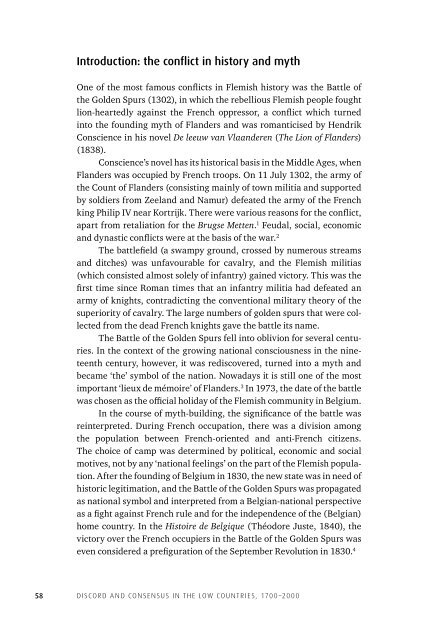Discord Consensus
7aze300jFJo
7aze300jFJo
Create successful ePaper yourself
Turn your PDF publications into a flip-book with our unique Google optimized e-Paper software.
Introduction: the conflict in history and myth<br />
One of the most famous conflicts in Flemish history was the Battle of<br />
the Golden Spurs (1302), in which the rebellious Flemish people fought<br />
lion-heartedly against the French oppressor, a conflict which turned<br />
into the founding myth of Flanders and was romanticised by Hendrik<br />
Conscience in his novel De leeuw van Vlaanderen (The Lion of Flanders)<br />
(1838).<br />
Conscience’s novel has its historical basis in the Middle Ages, when<br />
Flanders was occupied by French troops. On 11 July 1302, the army of<br />
the Count of Flanders (consisting mainly of town militia and supported<br />
by soldiers from Zeeland and Namur) defeated the army of the French<br />
king Philip IV near Kortrijk. There were various reasons for the conflict,<br />
apart from retaliation for the Brugse Metten. 1 Feudal, social, economic<br />
and dynastic conflicts were at the basis of the war. 2<br />
The battlefield (a swampy ground, crossed by numerous streams<br />
and ditches) was unfavourable for cavalry, and the Flemish militias<br />
(which consisted almost solely of infantry) gained victory. This was the<br />
first time since Roman times that an infantry militia had defeated an<br />
army of knights, contradicting the conventional military theory of the<br />
superiority of cavalry. The large numbers of golden spurs that were collected<br />
from the dead French knights gave the battle its name.<br />
The Battle of the Golden Spurs fell into oblivion for several centuries.<br />
In the context of the growing national consciousness in the nineteenth<br />
century, however, it was rediscovered, turned into a myth and<br />
became ‘the’ symbol of the nation. Nowadays it is still one of the most<br />
important ‘lieux de mémoire’ of Flanders. 3 In 1973, the date of the battle<br />
was chosen as the official holiday of the Flemish community in Belgium.<br />
In the course of myth-building, the significance of the battle was<br />
reinterpreted. During French occupation, there was a division among<br />
the population between French-oriented and anti-French citizens.<br />
The choice of camp was determined by political, economic and social<br />
motives, not by any ‘national feelings’ on the part of the Flemish population.<br />
After the founding of Belgium in 1830, the new state was in need of<br />
historic legitimation, and the Battle of the Golden Spurs was propagated<br />
as national symbol and interpreted from a Belgian-national perspective<br />
as a fight against French rule and for the independence of the (Belgian)<br />
home country. In the Histoire de Belgique (Théodore Juste, 1840), the<br />
victory over the French occupiers in the Battle of the Golden Spurs was<br />
even considered a prefiguration of the September Revolution in 1830. 4<br />
58<br />
DISCORD AND CONSENSUS IN THE LOW COUNTRIES, 1700–2000


